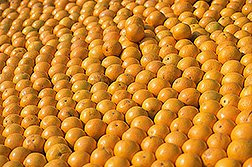Orange Peels Lower Cholesterol and Triglycerides
 Research shows that orange peels, traditionally discarded as non-value waste, lower cholesterol and triglycerides naturally. Polymethoxylated flavones in orange oil demonstrated significant cholesterol and triglyceride lowering in hamsters.
Research shows that orange peels, traditionally discarded as non-value waste, lower cholesterol and triglycerides naturally. Polymethoxylated flavones in orange oil demonstrated significant cholesterol and triglyceride lowering in hamsters.
Agricultural Research Service (ARS) scientists have recently learned that a compound found in orange oil decreases blood serum levels of the protein responsible for low-density lipoprotein (LDL) that's a major cholesterol carrier.
John A. Manthey, a chemist at the Winter Haven lab, is known for his work on citrus flavonoids in peel byproducts. His work has mainly focused on polymethoxylated flavones, or PMFs, which typically occur at very high concentrations in orange oil, especially in residues left behind after orange-oil processing. Orange-oil residues have traditionally been discarded as non-value wastes.
In Florida, about 700,000 tons of dried peel solids are left over from squeezing around 150 million boxes of juice oranges every year, on average. Most of this processing waste is now sold for livestock feed at little or no profit to citrus processors.
Manthey's research has shown that the PMFs decrease blood serum levels of apoprotein B, the structural protein of LDL cholesterol. Too much circulating LDL cholesterol can slowly lead to atherosclerosis, clogged arteries and eventual heart attacks and strokes. These problems are accelerated by chronic, low-grade inflammation in the blood vessels.
For the past eight years, Manthey has collaborated with KGK Synergize of London, Ontario, Canada, a company that specializes in research to identify health-promoting compounds and focuses on nutraceuticals. Sometimes called functional foods, nutraceuticals are natural, bioactive chemical compounds with disease-preventing or medicinal properties. Nutraceuticals are being commercially produced by food, pharmaceutical, and herbal and dietary supplement industries.
The original collaboration between ARS and KGK Synergize involved studies of anticancer properties of citrus PMFs, but it then expanded into investigations of the compounds’ abilities to lower LDL cholesterol in animals.
Subsequent ARS feeding trials with hamsters demonstrated significant cholesterol- and triglyceride-lowering actions of PMFs: At 1 percent of the diet, PMFs lowered blood plasma levels of LDL, very-low-density lipoprotein (VLDL) cholesterol, and triglycerides by 30-40 percent.
A diet of 0.25 percent PMFs resulted in smaller decreases in LDL and VLDL cholesterol, but decreases in triglycerides were as large as those occurring at higher PMF doses.
These findings are the basis of human trials, currently being conducted by KGK, on the cholesterol-lowering properties of PMFs.
Manthey’s previous research also provided evidence of anti-inflammatory actions of PMFs in animals—another mechanism by which the compounds may protect against cardiovascular disease. Products containing cardioprotective PMFs are being developed by some private companies.
Similar studies of cardioprotection have been started by Manthey and postdoctoral researcher Kanjana Mahatannahee on flavonoids and related phenols in select Florida-grown tropical fruits—such as mamey, guava, dragon fruit, and carambola. Scientists have found these to be extremely high in phenolic antioxidants.
Source: Alfredo Flores, Agricultural Research Service Information Staff. U.S. Department of Agriculture.
Related articles:
Cholesterol Lowering Benefits of Plant Sterols
Natural Cholesterol Remedies – Fruit and Veggies
LDL Cholesterol – The Good, the Bad and the Ugly
Tea in Your Diet Lowers Cholesterol
Blueberry Skins Lower Cholesterol Naturally
Bean Consumption Lowers Cholesterol
Dangers of Cholesterol Lowering Drugs
Policosanol lowers cholesterol without side effects
Cinnamon lowers cholesterol and triglycerides

